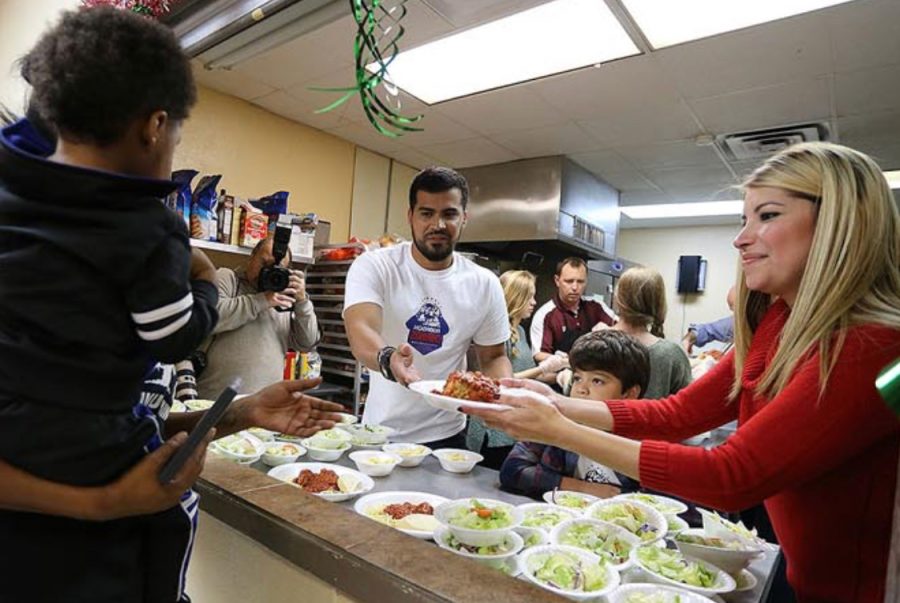Mansfield, Texas and the surrounding cities are a lower to upper middle class, privileged area to live in. A lot of the time, we forget that there are people in our own communities who do not live as well as others. However no matter where in the world a person lives, it is not easy to be young and low income.
Heather Willson, an AP Women’s History, AP Art History, and AP Psychology teacher at Lake Ridge, knows what it’s like to grow up in a family that is struggling financially and even had to overcome homelessness at one point in her life. Typically, she stays after school and lets students come into her classroom, part of that reason is because there are students who are underprivileged walking the hallways right beside us.
“School is climate-controlled safe environment, and there’s restrooms. And sometimes kids can find adults who will give them food. Luckily, those students have parents who care for them and they are receiving assistance by the time I find out. As a young person, most of the time, you are distracted. You are concerned about food because you’re hungry – always hungry. You’re distracted because you’re trying to figure out if you smell, or if kids are judging you for your clothes. You keep your head down and hope no one notices you because you’re self-conscious. You’re stressed because sometimes you don’t know where you’re going or if where you’re going is safe. School, grades, and everything in-between are a distant thought. This is what makes or breaks a kid though. Some people will fight and persevere, and others won’t” says Willson.
Aside from thinking about where they are going to go or how they are going to get their next meal, homeless people especially those located in higher income areas have to deal with the stigma of their struggling status. Shimetra Jones is a case worker at the Arlington Life Shelter in Arlington, Texas who works with clients from all different backgrounds. She helps the people staying at the shelter get back on their feet by helping them form budgets and connecting them with resources such as Goodwill or the Texas Workforce Commission.
The majority of Jones’s clients are local, in the Dallas, Fort-Worth Metroplex. In her job she works very up close and personally with people from all walks of life. She notices that there is an undesirable reputation that comes along with being homeless that make it even harder for these individuals.
“There is a stigma associated with homelessness for sure. Part of what I do is that monthly is go out to different apartment complexes in our area to find out what their requirements are as far as monthly rent, if they accept people who have criminal backgrounds, or if they have an addiction or a broken lease on their record. Sometimes we find that when we tell them upfront that we are working with the Arlington Life Shelter and we are looking for apartment complexes where we could refer some of our clients to they realize we are working with homeless people and they start naming all of these things that would make it impossible for our clients to get in. There’s also a stigma that all homeless people are lazy and that’s not true for sure. There are some people who are not motivated but I wouldn’t equate that with being lazy” explains Jones.
The Harvesting International Ministry Center is a food bank and pantry in Mansfield, Texas that sees about 500 families a month, with the majority being very local as well. That number is probably a lot higher than anybody would expect. Their President, Gregory Debrew has worked with the ministry for thirty years so he has connections with a lot of different donors.
The three things that would benefit low income individuals the most is for people to donate, volunteer, and keep an open mind. If young people want to make a difference the best thing to do according to Debrew would be to give back.
“Volunteer places and do fundraisers for different organizations because everyone is always needing finances or products. Young people within their network of friends can organize fundraisers and organize awareness in their communities,” says Debrew.
Awareness is the first step. It is important to recognize that there are people even nearby who do not have it easy, even in an area as affluent as Mansfield. There are homeless shelters and food banks nearby for a reason. Anywhere you go in America is going to have a low income or homeless population. Having patience and understanding for their situation and not discriminating based on financial status is a great way to make life a little easier for people who are already struggling.


